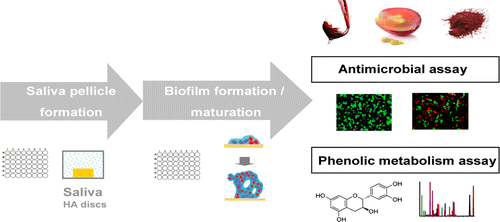Not just for the heart, red wine shows promise as cavity fighter

For anyone searching for another reason to enjoy a glass of red wine with dinner, here's a good one: A new study has found that red wine, as well as grape seed extract, could potentially help prevent cavities. They say that their report, which appears in ACS' Journal of Agricultural and Food Chemistry, could lead to the development of natural products that ward off dental diseases with fewer side effects.
M. Victoria Moreno-Arribas and colleagues explain that dental diseases are extremely common throughout the world. Cavities, periodontal disease and tooth loss affect an estimated 60 to 90 percent of the global population. The problems start when certain bacteria in the mouth get together and form biofilms, which are communities of bacteria that are difficult to kill. They form plaque and produce acid, which starts damaging teeth.
Brushing, fluoride in toothpaste and water and other methods can help get rid of bacterial plaques, but the effects are limited. In addition, currently used antimicrobial rinses can change the color of the gums and alter taste, so people are less likely to use them for as long as they should. Some research has suggested that polyphenols, grape seed extract and wine can slow bacterial growth, so Moreno-Arribas' team decided to test them under realistic conditions for the first time.
They grew cultures of bacteria responsible for dental diseases as a biofilm. They dipped the biofilms for a couple of minutes in different liquids, including red wine, red wine without the alcohol, red wine spiked with grape seed extract, and water and 12 percent ethanol for comparison. Red wine with or without alcohol and wine with grape seed extract were the most effective at getting rid of the bacteria.
More information: "Red Wine and Oenological Extracts Display Antimicrobial Effects in an Oral Bacteria Biofilm Model" J. Agric. Food Chem., 2014, 62 (20), pp 4731–4737. DOI: 10.1021/jf501768p
Abstract
The antimicrobial effects of red wine and its inherent components on oral microbiota were studied by using a 5-species biofilm model of the supragingival plaque that includes Actinomyces oris, Fusobacterium nucleatum, Streptococcus oralis, Streptococcus mutans and Veillonella dispar. Microbiological analysis (CFU counting and confocal laser scanning microscopy) of the biofilms after the application of red wine, dealcoholized red wine, and red wine extract solutions spiked or not with grape seed and inactive dry yeast extracts showed that the solutions spiked with seed extract were effective against F. nucleatum, S. oralis and A. oris. Also, red wine and dealcoholized wine had an antimicrobial effect against F. nucleatum and S. oralis. Additional experiments showed almost complete and early degradation of flavan-3-ol precursors [(+)-catechin and procyanidin B2] when incubating biofilms with the red wine extract. To our knowledge, this is the first study of antimicrobial properties of wine in an oral biofilm model.
Journal information: Journal of Agricultural and Food Chemistry
Provided by American Chemical Society
















